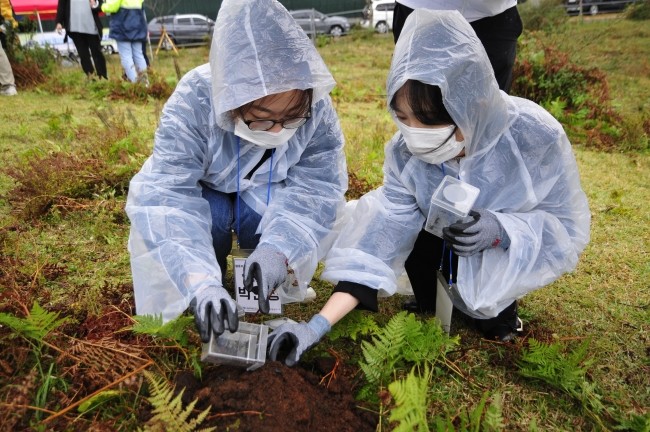|
One hundred scarab beetles, the endangered species that were successfully multiplied through artificial propagation, were sent back to nature.
On October 16th, Jeju Biodiversity Research Institute at Jeju Technopark, with related organizations including Yeongsan River Basin Environmental Office and Jeju Special Self-Governing Province, released scarab beetles, an endangered Class II species, in Namwon-eup, Seogwipo-si.
JBRI at JTP is an “Ex-Situ Conservation Institution” designated by the Ministry of Environment. Since its designation in December 2011, the institute has been carrying out a project to restore endangered species such as scarab beetles, giant water bugs, and two-spotted stag beetles in a concerted effort with the Yeongsan River Basin Environmental Office and Jeju Special Self-Governing Province.
To date, JBRI has restored and reintroduced 1,380 organisms to nature, including 50 in 2012, 150 in 2014, 80 in 2015, 150 in 2016, 350 in 2017, and 300 each in 2018 and 2019.
At this time, 100 of the 300 beetles that were reproduced through artificial propagation were released. Of these, 40 were released publicly, and the remaining 60 were released unofficially to prevent their illegal capture.
Scarab beetles are an endangered wildlife class Ⅱ dung beetle. They have a vertically narrow line on the elytra and are characterized by burrowing under domestic animals such as cattle or horses, transporting their dung to eat or lay eggs in them.
Scarab beetles have been included in the endangered species as their numbers dropped following significant changes in their habitat, including the recent decrease in available pastures, the effects of preservatives added to artificial feed, and the use of antibiotics and insecticides on livestock.
JBRI and the Yeongsan River Basin Environmental Office organized a small event due to the impact of COVID-19. To raise awareness on the protection of endangered species and environmental issues in Korea, the agencies plan to prepare another occasion where elementary school students and local residents can participate.
“We will try to conserve disappearing organisms through the continuous restoration of endangered species and invite the general public to participate in preserving the natural ecosystem,” said Director Jeong Yong-hwan of JBRI. |






















